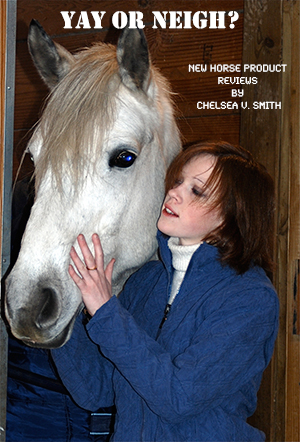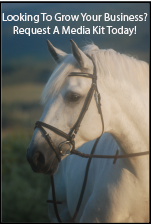The Ethical Nursemare ~ No Foal Left Behind
By Nikki Alvin-Smith
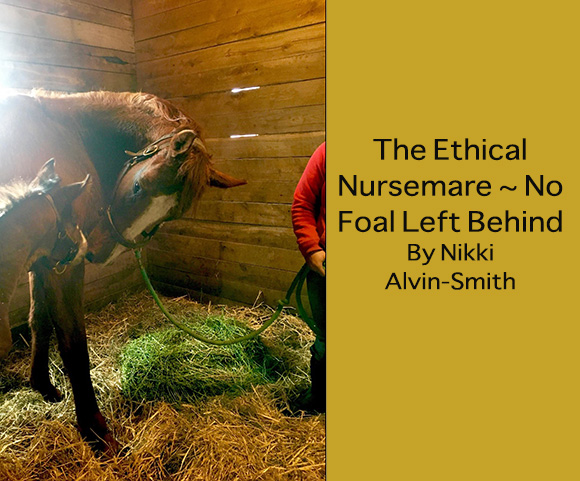
There is a better way to provide important nursemare help for orphan foals than breeding a mare for milk production and then turning her away from her biological foal to substitute another foal. This better method is also a more expensive method, but it is ethical as there is no foal left behind. It is called Hormonal Milk Induction and it does not work for every mare. The mare must have foaled out in the past and currently be ‘open’. You can then hormonally induce the mare to produce milk.
How does this work? Why should you care about providing a nursemare for an orphaned foal? Why not just bottle-feed it?
When you want answers ask an expert. We sat down with Laura Phoenix, owner and founder of Nursemares of the Northeast, based in Walton, NY to find out what is involved in providing the ethical nursemare service to the horse industry. Laura has eons of experience in providing nursemares for the orphan foal, whether it be the horse racing industry, backyard breeder, vet clinic or commercial horse breeding operator. Nursemares of the Northeast currently provide 28 plus mares to service orphan foal needs in the North East U.S.A. and along the Eastern Seaboard. Additionally her success rate in her mares and foals ‘taking’ is impressive. Here’s what Laura had to say:
CH: What is the difference between your operation, Nursemares of the Northeast and 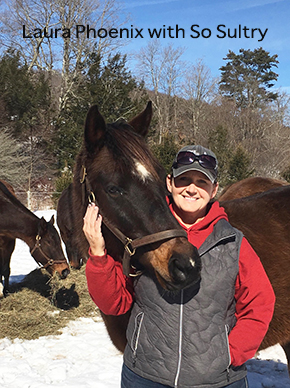 other nurse mare programs?
other nurse mare programs?
LP: In our program there are no foals left behind. As the milk production is hormonally induced, the mare lactates and with the correct nutritional support and hand milking she will fulfill all the needs of the orphan foal when they are introduced.
CH: Why don’t all nursemare programs operate this way?
LP: Hormonal Milk Induction can be more expensive and requires a lot of knowledge. This is not something just anyone can do. Thoroughbred farms like to use nursemares so the dam is removed from risk of injury, risk of hurting the foal as an inexperienced mother, and so they can get them back into their production line. They simply bring in a nursemare and then rebreed them before they leave so the nursemare operation is set for another ‘foal left behind’ the next year. This makes me very sad. The bottom line is probably the reason that many farms still operate with this old-fashioned approach. I would like to change all that. Hormonal Milk Induction is a kinder approach all around.
CH: What is your experience that brought you to develop this program?
LP: When I was young it was pre-milk induction so there were a lot of orphan foals that had to be dealt with and it broke my heart.
When I was a child/young adult the only way to have a nursemare was for her to have a baby that yes would eventually, sometimes sooner rather than later, become an orphan so that another baby could be sustained/raised on it’s mother’s milk. Sometimes that baby would do fine and sometimes not...some would go to rescues, some would be purchased by excited new owners, but sadly some could not and would not adjust to the life of an orphan and would succumb to death. I’m not saying that it doesn’t happen anymore, because it does. I always appreciated the fact that you feel good helping another foal out but felt there had to be a better way. With my experience with other nursemare operations over the years I became professional at bonding mares with their babies and I could figure out how to get a mare to accept their new foals. When I heard about hormonal milk induction I jumped on it. I worked at first with some of my own mares that had foaled out that I knew were good Mommas and then once I realized how well it worked I started adopting mares that had also been good Mommas in the past but needed new careers.
CH: Does the nursemare believe the orphan foal is hers?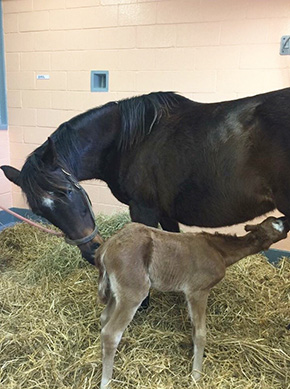
LP: In his business you have to know all the signs to look for because sometimes the mare likes the baby but isn’t quite sure it is hers so we have to be on top of that quickly. We pull out all the stops to convince her even it means taking the baby away and restarting the process. Then we have the mares that go crazy as soon as they see the foal and can’t wait to lick and smell and love them. The majority of our herd is like that and we call them our 5 star mares.
CH: How do you choose the best mares for the program?
LP: Good Mothering skills are a must and most of our mares are adopted Thoroughbreds that had no usefulness so it is a win/win. The farms don’t have to carry them anymore and they never fall into the sale ring this way. I always update my farms and send them pictures when the ladies I got from them go out and love it. I also make it clear that if they don’t work out as nursemares that they will be going back to said farms unless another safe place to land comes up.
CH: How do you know a mare will take a orphan foal?
LP: You never know for sure but I have enjoyed a high success rate. With my experience I know immediately as soon as they see each other. Usually most of my mares walk in and immediately take over. Within 15 to 30 minutes I can feel completely comfortable leaving the farm folks in charge and head back home. I generally ask that someone stays in the stall observing the new pair until the foal lays down to sleep and then gets up and nurses again. If there are no signs of a question from the mare we are in the clear at that point. I always err on the side of caution.
CH: What are the main reasons someone would want to use a nursemare? of bottle feeding the foal?
LP: The main need for nursemares is the death of the dam, a rejection by the dam of the foal or sometimes the farm doesn’t want to send foals to a breeding shed too far away so would like to bring the nursemare to the foal.
CH: What can breeders that experience an orphan foal do to aid you in making the match a success if anything?
LP: Call us as soon as possible and follow instructions. We will typically ask about the size of the foal especially if we have multiple mares ready to go just simply to match then up as best as possible but it is not a necessity. I did have a pony baby last year at New Bolton Vet Center and we did send our smallest mare that was in milk and everything was fine.
CH: How long does the foal generally stay on the nurse mare?
LP: A nursemare is generally leased for up to 6 months. We have them come home as early as 4 months. I generally allow the foal owners the freedom to send them back anytime but I like all my mares home by November 15th so they can get back home and take a break and rest up for the following season. Most of the ladies come home September/October depending on the weaning and when they originally went out.
CH: What happens to your nurse mares off breeding season?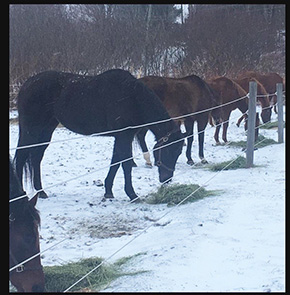
LP: When the mares are on downtime they are turned out in our pastures and allowed to relax and have some well deserved ‘me’ time with their fellow nannies. It is sweet when friends reunite and greet each other. I often wonder if they talk about their babies each year.
CH: Why is a nursemare better for a foal than being bottle and bucket fed?
LP: Hormonally induced mares are more expensive initially than natural foaling mares due to the cost of the medications and the labor costs to start and maintain these mares, however there is a lot to be saved as you don’t have the expense of having to get them back in foal for the following year. With that being said the average cost of a nursemare ranges from $2000-$3000 plus mileage to get her to you, and back home when she’s done with her job. You keep the mare for up to six months or until you wean your foal. Other than feeding and basic care, usually, there are no other costs associated with the nursemare . The end result is, your baby will have a momma that will protect, love and feed it all by herself. There is one more very important factor of your baby having a nursemare. This mare will teach your foal to eat hay and grain and instill manners and habits that are appropriate and necessary for your foal. This is very important for the future of your foal so they can grow into strong, confident adult horses.
Now let’s look at bucket/bottle raised foals. The average cost of quality milk replacer is between $40-$60 per week. In the beginning a foal needs to eat every 2 hours and that will take some very dedicated people that like to get up in the middle of the night! Your foal will require milk for approximately 4-6 months. Foals also require love, nurturing and companionship just like any other baby. Without it they will not thrive. They will subject to picking up bad habits such as weaving, pacing, cribbing as well as the most dreaded, depression. Those are just what we can see, internally these foals can also become a nightmare they are prone to ulcers and impactions and plenty of other orphaned induced issues, but it doesn’t stop there. A lot of these foals are often terribly rude and hard to deal with as they don’t have a mom to say, “cut it out before I bite your butt!!”
This issue makes them difficult to train and often lands them in a bad place as adult horses. Now let me be clear this is not always the case. There have been plenty of babies raised on buckets that this has not happened to. But let’s stay on target. There is additional expense that no one seems to acknowledge. Your bucket/bottle foal will need a friend so that means, on top of it all, you will have to get another mouth to feed and when your foal grows up and that “buddy” is no longer needed you will have to figure out what to do with them. You probably are going to end up with that mouth to feed for quite some time as they have become part of the family and that’s what “we” horse people do.
It might be easy to say that I am an advocate of hormonally induced Nursemares and you wouldn’t be wrong. To me the proof is in the pudding. First it is more economical. You may be able to cut corners to make bottle and bucket feeding a little less but it can never replace the love of a real mother.
I hope if you are struggling with a decision based on your foal’s future that this can help guide you to make the best possible decision for you!
CH: What is your best success story?
LP: I would say my best success story would have to be a little guy named Rebell, a cute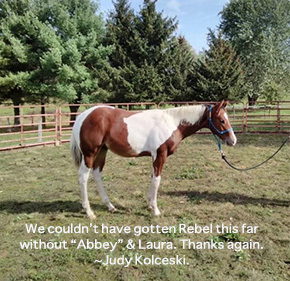 little paint colt from the Syracuse area. Rebell lost his biological momma when he was almost 2 weeks old. At that point Mark and Judy began bottle/bucket feeding him but soon realized that the best thing for both themselves and their baby was to try to find a nursemare. We went as soon as we got the call.
little paint colt from the Syracuse area. Rebell lost his biological momma when he was almost 2 weeks old. At that point Mark and Judy began bottle/bucket feeding him but soon realized that the best thing for both themselves and their baby was to try to find a nursemare. We went as soon as we got the call.
Both of the mares I had in milk had never done this job before so I decided to bring them both just in case. Well even though we tried to be prepared this situation was unique as Rebell was loudly colored as well as very rude and pushy due to the bottle/bucket feeding with the absence of his mom teaching him how to be respectful. Sadly both mares said no. I was shocked for me this was totally unheard of and I tried to help Mark and Judy find another nursemare as my next 2 mares that were started into their induction protocol were not far enough along. We needed another 3-4 days before we could even try it. The search turned up nothing productive, so when Fiona became ready we went back with her. Now Rebell was even fresher and bigger than before. Fiona kind of liked him and then would get really upset with him when he would try to climb up her side so Judy and I stayed in the stall all night keeping Rebell safe as well as minding his manners. We played all kind of bonding games that looked promising but ultimately they never took hold completely.
Judy and Mark were besides themselves and couldn’t bear the thought of another day carding for this adorable but yet unruly little guy. Judy said Laura Mark and I talked and we want to give you Rebell, we just can’t handle this anymore. With that I knew I had one more mare left at home to bring into milk and her name was Abby and I was not totally convinced that Fiona wouldn’t take him in a day or 2. So I offered to take Rebell home and then send him back once I was able to get him a momma. I kept him with Fiona as much as possible and created a 1/2 wall stall just so he would have companionship with out the danger of getting kicked or bitten. I would take him for walks outside and Fiona would call for him but then ultimately we just couldn’t get it done to where I felt comfortable leaving them alone.
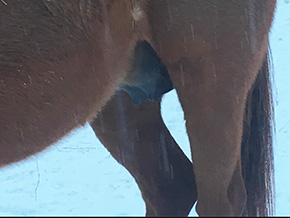 Finally Abby was ready so I took a deep breath said a prayer and started the introduction. All I can say is thank the good lord for Abby. It was love at first sight and the match was made. We kept Rebell and Abby with us for 3 days to be sure the milk production was moving in the correct direction then happily called Mark and Judy with the news that they could come pick up Rebell and Abby and take them home. Their joy and appreciation was overwhelming and a friendship was made. Abby is now back home a ready to do her job again this year and Rebell is turning into a very nice well-adjusted yearling.
Finally Abby was ready so I took a deep breath said a prayer and started the introduction. All I can say is thank the good lord for Abby. It was love at first sight and the match was made. We kept Rebell and Abby with us for 3 days to be sure the milk production was moving in the correct direction then happily called Mark and Judy with the news that they could come pick up Rebell and Abby and take them home. Their joy and appreciation was overwhelming and a friendship was made. Abby is now back home a ready to do her job again this year and Rebell is turning into a very nice well-adjusted yearling.
CH: Any advice for someone else trying to start out in the nurse mare biz?
LP: Advice for someone trying to start a nursemare operation is get ready because it is an emergency service and you have to be ready at a moments notice. Start small and grow your herd on a need basis. Integrity and honesty are key in any business and if you are doing hormonally induced mares, please do them correctly. This is so important. The nursemare industry has a chance to be a good industry with the ability to bring these mares into milk. In many cases people send these mares out too soon without the proper bags and support which inevitably makes them seem more difficult and less desirable than natural foaling mares but my mission is to prove that this doesn’t have to be and isn’t the case.
CH: What is the best method for people to contact you if they need a nursemare and want to go the ethical route?
LP: The best way to contact me is to call both numbers and leave a message: 607 437-0479 cell and
607 865-8071 home. We check messages frequently during Nursemare season.
We can be contacted as well on Facebook at Nursemares of the Northeast...
again nursemares are an emergency service so we encourage people to call as soon as a need arises even if it is in the middle of the night. It helps us prepare to leave as quickly as we can to get your foal a momma.
Before we finished the interview I asked Laura, who is a successful competitor and trainer in top level barrel racing in addition to having a passion for the ethical nursemare, what sums up her attitude to her business Nursemares of the Northeast:
“ Blessed be the broodmare but heaven sent the Nursemare.”

